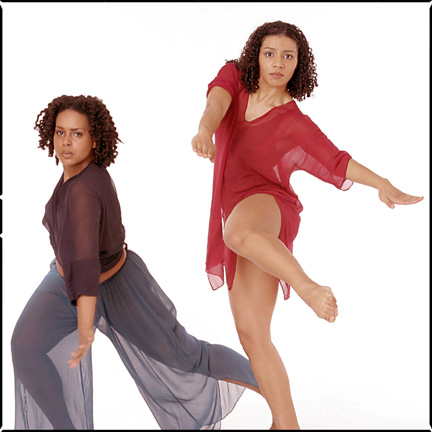Urban
Bush Women
Joyce Theater
New York, NY
June 21, 2005
by
Susan Reiter
copyright
©2005 by Susan Reiter
 Although
the program gave no indication, the opening night of Urban Bush Women's
twentieth anniversary season at the Joyce was a celebratory gala, and
quite a party it was. You could tell something was up even before going
inside; there was the great actress Ruby Dee giving a television interview
outside the theater. Another exceptional actress, Lisa Gay Hamilton, in
her role as gala co-chair, admitted in her exuberant brief welcoming remarks
to being a "wannabe Urban Bush Woman," having attended their
early performances during her student days.
Although
the program gave no indication, the opening night of Urban Bush Women's
twentieth anniversary season at the Joyce was a celebratory gala, and
quite a party it was. You could tell something was up even before going
inside; there was the great actress Ruby Dee giving a television interview
outside the theater. Another exceptional actress, Lisa Gay Hamilton, in
her role as gala co-chair, admitted in her exuberant brief welcoming remarks
to being a "wannabe Urban Bush Woman," having attended their
early performances during her student days.
The evening was certainly an occasion of heartfelt celebration, a gathering of UBW alumnae and friends, but in addition to noting the significant achievement of the past two decades, it also offered some new and quite serious work. Founder/artistic director Jawole Willa Jo Zollar has sustained and expanded her vision of celebrating the power and eloquence of black women, in all shapes and sizes, exploring the deep roots of the past and the profound issues of the present.
The opening solo, "Give Your Hands to Struggle," took the potentially dangerous route of setting movement to, initially, a grave recitation of landmark names from the civil rights struggle. As the list progressed from W.E. B DuBois to Shirley Chisolm, Amara Tabor Smith remained rooted within a circle of light—reaching, stretching and scooping with fervent, quiet power. With her movement drawing the focus to her hands in a quietly insistent way. When the spiritual of the title began, her movement loosened up and moved out into space, always resonating with urgency. An excerpt form a large 1998 work, this solo made a particularly strong impact on the day when an elderly Mississippi man had finally been brought to justice for the1964 murder of three civil rights workers.
Zollar's 1986 "Girlfriends," a depiction of college roommates was clearly a familiar favorite to many in the audience. Its quartet of women in robes, pajamas and slips conduct "conversations" and reveal themselves through sly, witty, sometimes exaggerated body language and poses. It inspired a lot of knowing laughter in reaction to depictions of sassy attitude and haughty put-downs, as we could all recognize the foibles and pettiness of such a situation.
Zollar's ambitious, somewhat murky but often stunning new "Walking with Pearl—Africa Diaries" emerged form the choreographer's fascination with the late Pearl Primus' unpublished writings from her period of study in Africa. She sat stage right and read, quite hauntingly and expressively, but with no excess embellishment, Primus' words, as the full company, in an array of loose, deep-hued, draped tops and skirts evoked the history, connections and sense of discovery they evoked. Zollar also assembled a gorgeous score of African music, with sounds of water and other natural phenomena mixed in.
Some of the words she intoned, however deeply she may connect to them and how powerfully the come across when read, sound somewhat stilted when heard aloud—statements on the meaning of dance and its role in Primus' life—veer towards pontificating. But the work gathered focus, and calmly, gradually grew us in, as the women's supple, full-bodied movement expresses everything from serenity to pride to rage. It all came together in a culminating description of a riveting, almost overwhelming African, sunset. We suddenly notice the deep reds of many of the costumes, and the women's sensual, curving undulations and earthy energy seem to embody some primal, larger-than-life essence.
Zollar's raucous and sly "Batty Moves," which celebrates women with large bottoms and the beauty of ample shapes, was expanded to include an honor roll of UBW alumnae whose names Zollar excitedly read off as she called them to the stage. Each more stunning than the last, they formed a vivid, anti-chorus line of several dozen, breaking into spontaneous solos, shaking and swooping and clapping with joyous abandon. The UBW come in all shapes and sizes, with some quite tall and lean, and others more compact and fleshy. What they all share—and the present group of eight is an exceptionally vivid, striking ensemble—is a belief in their bodies' ability to express deep truths that need no translation.
Photo: Anthony Tempe
Volume 3,
No. 26
July 4, 2005
copyright
©2005
Susan Reiter
www.danceviewtimes.com
|
|